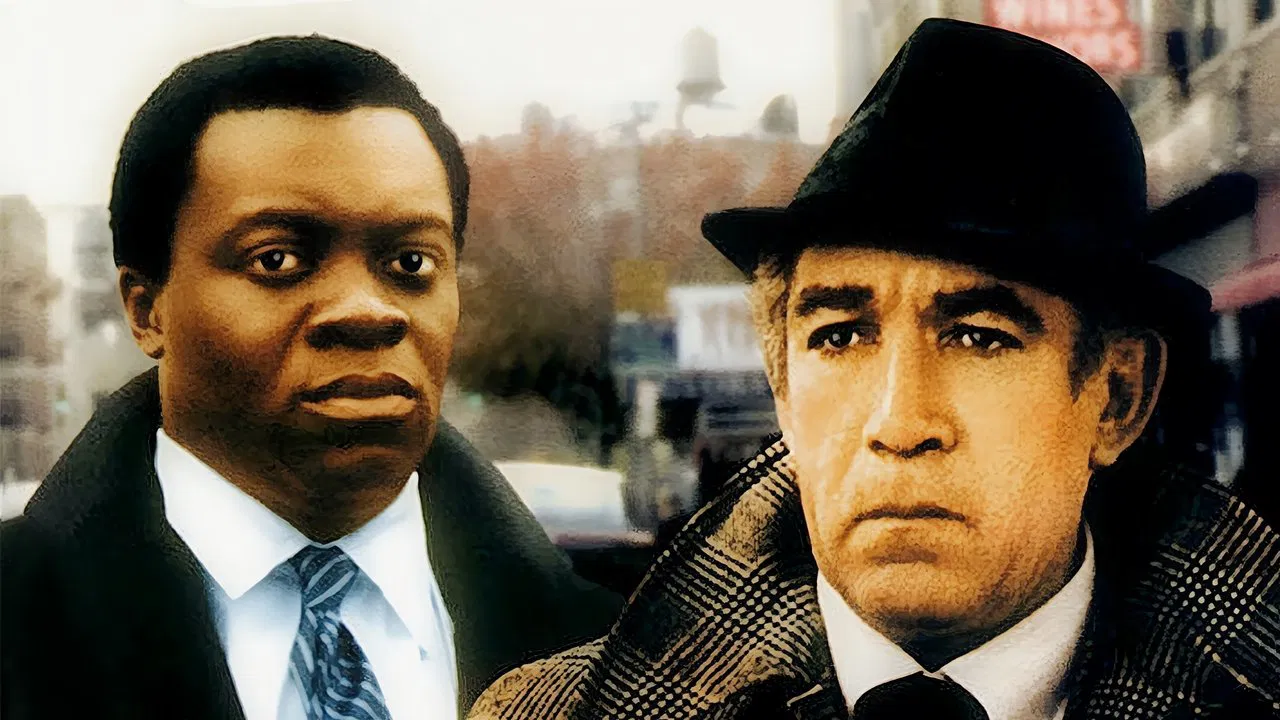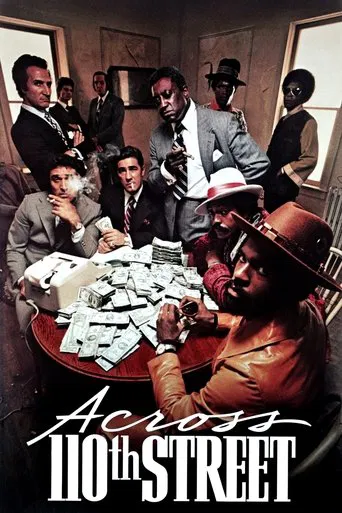

Thanks for the memories!
... View MoreDisappointment for a huge fan!
... View MoreClever and entertaining enough to recommend even to members of the 1%
... View MoreIt's the kind of movie you'll want to see a second time with someone who hasn't seen it yet, to remember what it was like to watch it for the first time.
... View MoreAnother film inspired by a song, the racier version I didn't so much like, when compared to the one played at the start of QT's Jackie Brown. As for the movie, I did like, where I've seen it now, four to five times. This is an interesting cop drama with an interesting though simple plot, the movie that falls on the verge of a blaxploitation one, a little saggy though in part. Quinn plays a near retiring detective, 55, worn and weary, where he's spent 60 percent of his life in his occupation. His unconventional methods of force, as he says "get's results". After a mob money rip off by three small time ex cons, where a couple of black cops get in the line of fire with some other casualties, being that of the mob boys, he's assigned with a black cop (Yaphet Kotto) who as he says, is "running the show". That he is to Quinn's dislike, where the two form a kind of partnership and mutual friendship. Now we know, stolen money is dead money, and if it's mafia involved, those three thugs lives are dwindling, their fate so foreseeable, the last of three, creating a memorable and honorable death, followed by a shock passing from Quinn's character. We too get into the three black guy's lives, and their conflict with their partners, over their fateful actions, which I liked. Anthony Franciosa (Finder Of Lost Loves, Tenebrae, really is the standout in this and if you push his buttons, the fun is watching in how he responds. Antonio Fargas, an actor I've always liked and enjoyed watching, with his ugly black mug, is fun to here, as he is in other pics, as one of the low life money stealing who meets a short demise. At the other end of this bar, it's always a privilege fine actor Quinn, and here he's top form, giving reality and believiability to this character, even though his unjust methods are kind of reprehensible. This oldie but goodie seventies movie, isn't the best of it's time, but still stacks up pretty well, due to it's story, with some heavy and impactful violence, and it's other asset, Franciosa.
... View MoreAdapted from Wally Ferris's 'Across 110th' (Harper & Row, 1970) by playwright-screenwriter Luther Davis ('Lady in a Cage'), 'Across 110th Street' is often lumped into the blaxploitation genre but is atypical in several respects. Created by white filmmakers, 'Across 110th Street' does not cater to black audiences by featuring the requisite black-urban-outlaw-superhero wreaking vengeance on the white power structure through acts of stylized mayhem. A cross-town street, 110th in Manhattan skirts the northern edge of Central Park and divides Harlem to the north from the upper East and West Sides, i.e., the then-mostly poor black and Hispanic ghetto from the mostly affluent white districts. More than a street, 110th is the city's dividing line between the haves from the have nots. Three black working-class Harlemites—Joe Logart (Ed Barnard), Jim Harris (Paul Benjamin), and Henry J. Jackson (Antonio Fargas)—figuratively cross the line when they rob a mafia counting house in Harlem of $300,000 and, in the process, kill seven people including two cops. The robbery and mass murder naturally trigger parallel pursuits by the NYPD and the mafia; the former determined to bring the trio to justice, the latter bent on exacting vengeance and recovering the stolen loot. Because the crimes took place in Harlem, Lt. Pope (Yaphet Kotto), a young, by-the-book black detective, is put in charge of the investigation, much to the chagrin of Capt. Mattelli (Anthony Quinn), a brutal, racist 55-year-old cop strictly "old school" in his methods and beliefs: the kind of match-up already made archetypal by Sidney Poitier and Rod Steiger in 'In the Heat of the Night' (1967). On the mafia side, Nick D'Salvio (Anthony Franciosa), the grinning, psychopathic son-in-law of a mafia don, is assigned the task of catching the three killer-crooks. Further complicating the situation is the menacing power of Mr. Jessup (Joe Attles), a gruff black crime boss who maintains an uneasy alliance with the mafia and crooked cops (including Capt. Mattelli) over the rackets in Harlem. Across 110th Street fails to generate much suspense because the mafia easily bests the cops in getting to each of the fugitives first. On the upside, Barry Shears' direction is surefooted, the film is graced by an evocative soundtrack by Bobby Womack and J.J. Johnson, and features solid acting, relentless action, suitably grotesque violence, and an aura of gritty authenticity that could only be had by filming on location in New York City at one of the lowest points in its modern history. Blaxploitation fan Quentin Tarantino incorporated a version of Bobby Womack's title track, "Across 110th Street," into his third film, 'Jackie Brown' (1997). VHS (1998) and DVD (2001).
... View MoreThree black hoodlums break into an apartment in Harlem where the Italian Mafia is collecting their proceeds for the week from their local black henchmen. A gunfight breaks out and all of the Mafia members are killed. Responding to the commotion two police officers are also gunned down by these same gunmen who manage to get away with $300,000 of the Mafia's money. This causes quite a stir within the Mafia as they fear losing control of Harlem to local black gangsters. So "Nick D'Salvio" (Anthony Franciosa) is sent into Harlem to find those responsible and make an example of them. Likewise, the police also want to bring these three men into custody for killing two of their own. So with both the Mafia and the NYPD looking for them the odds against any of these three crooks getting away are pretty slim. Especially since one of them, "Henry J. Jackson" (Antonio Fargas) makes no effort to hide his newly gotten wealth. Anyway, this film is notable for showing Harlem from a certain perspective that is not too kind. It is dirty and gloomy. But in the process it adds a sense of realism to everything. Both Anthony Quinn (as "Captain Mattelli") and Yaphet Kotto ("Lieutenant Pope") perform in an adequate manner in spite of the fact that their characters are obvious Hollywood creations. However, one thing I didn't care for was the last scene at the end which I thought was completely unnecessary. But that's just my opinion. In short, I rate this film as slightly above average.
... View MoreDisguised as cops, three black crooks steal a big amount of cash after killing five syndicate runners and two policemen The New York police and the Mafia react with immediate concern Tough police veteran Captain Frank Mattelli (Quinn) resents the intrusion of Lieutenant Pope (Kotto), a black detective, in the case, while Mafia boss Don Gennaro (Frank Mascetta) sends his paranoid son-in-law, Nick D'Salvio (Anthony Franciosa), to reassert control over the Harlem branch and see that the money is recovered The black syndicate, headed by Doc Johnson (Richard Ward) and his assistant Shevvy (Gilbert Lewis), rejects D'Salvio, while promising only token help, and accuses Mattelli, who has been on the take from Johnson for years Anthony Quinn plays well the ageing detective who has long ago perceived that all his efforts are not going to do more than raise the very small part of the cover of crime, but he is not above taking a bribe from a racketeer His method of dealing with a reluctant witness is to hit hard first and ask questions later The rigorously legal approach to police work, as exemplified by Yaphet Kotto, is not for Quinn This is his territory, his little kingdom, and he keeps the peace as best he knows
... View More